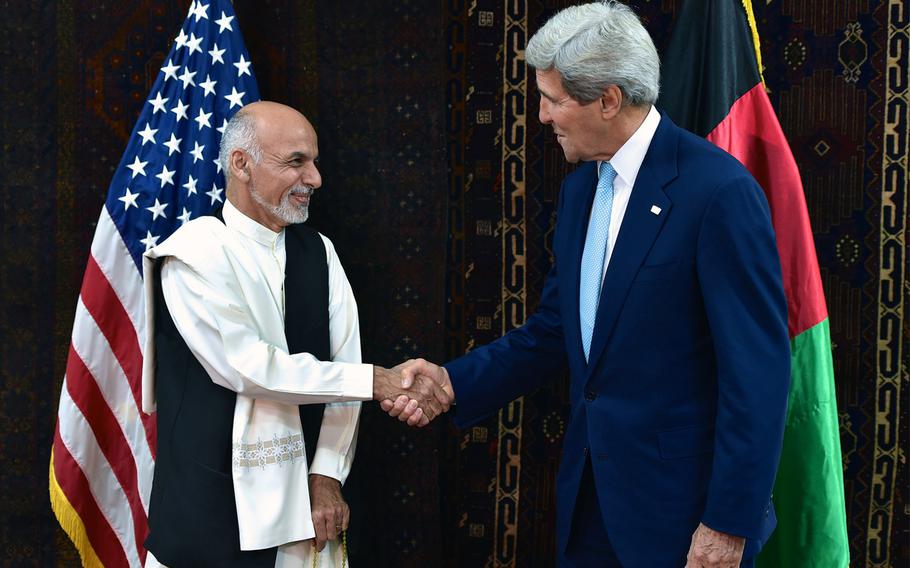Middle East
Kerry visits Afghanistan in bid to broker election resolution
Stars and Stripes July 11, 2014

U.S. Secretary of State John Kerry shakes hands with Afghan presidential candidate Ashraf Ghani at the U.S. Embassy in Kabul on Friday, July 11, 2014. (State Department)
KABUL — U.S. Secretary of State John Kerry spent Friday in Afghanistan meeting with political leaders in a bid to defuse a deepening dispute over the presidential elections that threatens the future of international aid and involvement in the country.
Former Foreign Minister Abdullah Abdullah, who received the most votes in the first round but fell to second place after a runoff poll, has charged that the election was rigged against him by election officials, current President Hamid Karzai and frontrunner Ashraf Ghani.
Abdullah’s supporters have called on him to form a separate government, a move that he has yet to make but that he has signaled he is considering.
Kerry has denounced the idea of splitting the government, and both he and U.S. President Barack Obama have reached out to the candidates in recent days to try to broker a resolution.
The Secretary of State met with both Abdullah and Ghani, as well as Karzai, in an effort to push the message that the U.S. supports a “thorough review of all reasonable allegations of fraud” and “will not accept any extra-constitutional measures,” according to the State Department.
“We want a unified, stable, democratic Afghanistan,” Kerry said in a statement made before meeting with Abdullah. “It is important that whoever is president is recognized by the people as having become president through a legitimate process, and that a government be one that can unify the people and lead into the future.”
Neither candidate’s campaign commented on the discussions, but in statements released before the meetings, both Abdullah and Ghani welcomed Kerry’s presence.
“Our commitment is to ensure that the election process enjoys the integrity and the legitimacy that the people of Afghanistan and the world will believe,” Ghani said. “Therefore, we believe in the most intensive and extensive audit possible to restore faith.”
Representatives of the United Nations met with Karzai on Thursday and presented a plan for a more extensive audit of the second-round results. Karzai expressed support for the idea, but an agreement between the two candidates has been elusive.
U.S. officials say they don’t favor any one candidate over the other but are pushing for an audit of the disputed ballots. Facing criticism over heavy-handed measures during the last election in 2009, American authorities had taken a hands-off approach to the current process.
But Abdullah’s brinkmanship, heated rhetoric by the candidate’s supporters, and growing evidence of widespread fraud has led to a more active role by U.S. officials, including phone calls from Obama, visits by the top members of the Senate Armed Services Committee, and now by Kerry.
“What we don’t want to see is a divided Afghanistan,” State Department spokeswoman Jen Psaki said in a briefing in Washington, D.C., on Thursday. “We don’t want to see any candidate or entity in Afghanistan continue down any path that would lead to a divided Afghanistan.”
The United States and other countries involved in the international military mission in Afghanistan are closely watching the election as evidence that the country is moving toward stability.
NATO is preparing to pull the last of its combat forces from Afghanistan by the end of the year, and the U.S. and its allies are hoping to strike a deal that would keep thousands of troops in the country for several more years at least. Although both candidates have said they would sign the troop agreement, the lingering political crisis is threatening to derail those plans.
Afghanistan receives billions of dollars in military and economic aid, which could also be at risk if the political situation deteriorates.
“Any extra-constitutional actions which would impact the unity of Afghanistan would result in the immediate end of U.S. assistance to Afghanistan,” Psaki said. “That’s not our preference. That’s not what we want to do, but that has certainly been communicated to the candidates.”
Taliban insurgents, who staged a number of attacks before and after the vote, have dismissed the elections and vowed to continue fighting until all foreign troops pull out of the country.
smith.josh@stripes.comTwitter: @joshjonsmith